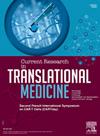Effect of adipose-derived mesenchymal stromal/stem cells on mouse mammary tumour growth and formation of lung metastases
IF 3
4区 医学
Q2 MEDICINE, RESEARCH & EXPERIMENTAL
引用次数: 0
Abstract
Background
The role of mesenchymal stromal/stem cells (MSCs) in tumour development and progression remains a subject of debate. Previous studies have reported contradictory outcomes, possibly due to variations in experimental design and the use of xenograft models. Xenograft models limit interpretation and translation due to cross-species variability. To address these limitations, we employed an isogenic mouse model of spontaneous breast cancer (BC) to investigate the impact of murine MSCs on BC development and progression. Methods: MSCs isolated from FVB/N mouse adipose tissue (mASCs) were administered to female mice with palpable mammary tumours. Tumour volume and mass were assessed, and analysis of histopathological necrosis and gene expression was conducted on mammary (MT) and lung metastatic tumours (LT). Results: No change in MT mass and volume was observed between mASC-treated and control mice. However, mASC treatment led to increased necrosis in LT but not in MT. Immunohistochemistry revealed that mASC-treated mice had fewer CD163+ anti-inflammatory macrophages in the LT but not in the MT. Tgf-β3, vegfr1, and cd105 were observed and downregulated in both MT and LT in mASC-treated mice. The downregulation of cd36 and tgf-β3 contributes to pro-tumourigenic activities, whereas the downregulation of vegfr1 and cd105 is associated with an anti-tumour effect. In the mASC treatment group, all cytokines tested for, except IL-27, were elevated. Conclusion: This study suggests that mASCs are anti-tumourigenic in pulmonary metastatic BC. Our findings emphasize the importance of considering the tumour microenvironment and employing relevant animal models when investigating the impact of MSCs on tumour progression.
脂肪源性间充质干细胞对小鼠乳腺肿瘤生长和肺转移形成的影响
背景间充质基质/干细胞(MSCs)在肿瘤发生和发展中的作用仍然是一个有争议的话题。先前的研究报告了相互矛盾的结果,可能是由于实验设计和异种移植模型的使用不同。由于物种间的差异,异种移植模型限制了解释和翻译。为了解决这些局限性,我们采用了一个等基因小鼠自发性乳腺癌(BC)模型来研究小鼠间充质干细胞对BC发展和进展的影响。方法:从FVB/N小鼠脂肪组织(mASCs)中分离的MSCs给予可触及乳腺肿瘤的雌性小鼠。对乳腺(MT)和肺转移瘤(LT)进行肿瘤体积和质量评估,并进行组织病理学坏死和基因表达分析。结果:经masc处理的小鼠与对照组相比,MT的质量和体积没有变化。然而,mASC治疗导致LT中坏死增加,而MT中没有。免疫组织化学显示,mASC治疗小鼠LT中CD163+抗炎巨噬细胞减少,而MT中没有。Tgf-β3、vegfr1和cd105在mASC治疗小鼠MT和LT中均观察到下调。cd36和tgf-β3的下调有助于促肿瘤活性,而vegfr1和cd105的下调与抗肿瘤作用有关。在mASC治疗组中,除IL-27外,所有细胞因子检测均升高。结论:本研究提示mASCs在肺转移性BC中具有抗肿瘤作用。我们的研究结果强调了在研究MSCs对肿瘤进展的影响时考虑肿瘤微环境和使用相关动物模型的重要性。
本文章由计算机程序翻译,如有差异,请以英文原文为准。
求助全文
约1分钟内获得全文
求助全文
来源期刊

Current Research in Translational Medicine
Biochemistry, Genetics and Molecular Biology-General Biochemistry,Genetics and Molecular Biology
CiteScore
7.00
自引率
4.90%
发文量
51
审稿时长
45 days
期刊介绍:
Current Research in Translational Medicine is a peer-reviewed journal, publishing worldwide clinical and basic research in the field of hematology, immunology, infectiology, hematopoietic cell transplantation, and cellular and gene therapy. The journal considers for publication English-language editorials, original articles, reviews, and short reports including case-reports. Contributions are intended to draw attention to experimental medicine and translational research. Current Research in Translational Medicine periodically publishes thematic issues and is indexed in all major international databases (2017 Impact Factor is 1.9).
Core areas covered in Current Research in Translational Medicine are:
Hematology,
Immunology,
Infectiology,
Hematopoietic,
Cell Transplantation,
Cellular and Gene Therapy.
 求助内容:
求助内容: 应助结果提醒方式:
应助结果提醒方式:


